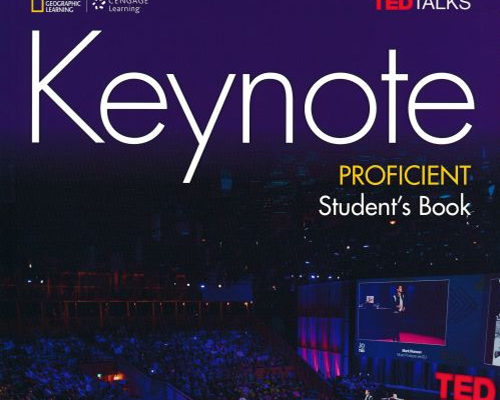Listening Cherry 24 – Keynote wins ELTon – lovely versions of ‘asked’
Last week, I was at the British Council’s ELTons awards for Innovations in English Language Teaching. The winner of the award for ‘Excellence in Course Innovation’ was Keynote of which you can see the cover of the highest level ‘Proficient’ above. I was delighted for them, as I was rooting for them.
The authors Paul Dummett, Helen Stephenson and Lewis Lansford are to be congratulated – as well as (of course) the design and editorial teams.
Each of the twelve units begins with a TED talk from speakers of British, American, Australian, African, Swedish and Indian English. And the range of accents is wonderful, giving a lovely juxtaposition of (a) native speaker correctness in the pronunciation component of the materials, and (b) what the speakers actually do in their TED talks.
For example, the pronunciation section in Unit 2 focuses on consonant clusters, among which is the word ‘asked’, giving the reference pronunciation as a British English Greenhouse form – as in row 1 of the table below.
In the TED talks themselves however there are examples of ‘what speakers of English actually say’. With ‘asked’ – and with a number of the consonant cluster words – very few people anywhere in the world say them as perfectly as the actor giving the greenhouse form. The ‘k’, and the ‘t’ at the end of ‘asked’ are often dropped; and the vowel varies a huge amount: that wonderful enthusiast and communicator Hans Rosling has a Swedish-English(?) pronunciation in which the vowel in ‘asked’ rhymes with BrE ‘law’ – cf. row 2 in the table below.
For fun, in row 6 I have spliced together the instances of ‘asked’ with one immediately neighbouring word, and in row 7 I have spliced together the instances of the single words.
Greenhouse | Garden/Jungle |
|||
|---|---|---|---|---|
1 | asked | |||
2 | and then I ask my students I've asked them over the last two years I've asked |
|||
3 | My mom asked me what I would want my house to look like |
|||
4 | I asked him how he became such an expert on fish |
|||
5 | She asked where I had learned to speak English so well |
|||
6 | asked asked them/asked me/asked him/she asked |
|||
7 | asked asked/asked/asked/asked |
|||
The juxtaposition above is not representative of the presentation in the student’s book. The book is beautiful to look at, but does not bring the sound files side-by-side like this. (Though the as yet unpublished additional components may do so).



Leave a Reply